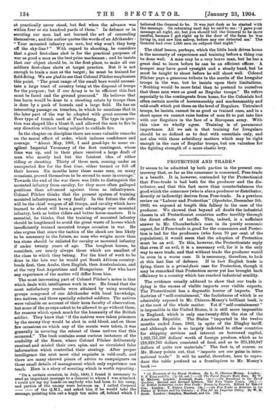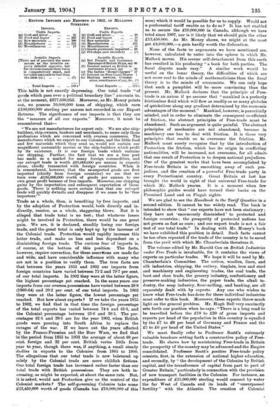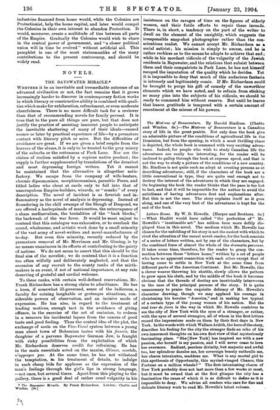IT seems to be admitted by both parties in the
present con- troversy that, so far as the consumer is concerned, Free-trade is a benefit. It is, however, contended by the Protectionist that Free-trade is bad both for the producer and the dis- tributor, and that this fact more than counterbalances the good which the consumer (who is also a producer or distributor, directly or indirectly) derives from Free-trade. In a previous review on "Labour and Protection" (Spectator, December 5th, 1903) we exposed at length this fallacy in the case of the producer. We showed that beyond all doubt the industrial classes in all Protectionist countries suffer terribly through the direct effects of tariffs. This, indeed, is a sufficient answer to Mr. Chamberlain's case in its purely economic aspect, for if Free-trade is good for the consumers and Protec- tion is bad for the producers (who form 70 per cent. of the population), it would seem that the adoption of Protection must be an evil. To this, however, the Protectionists reply that even if an evil, it is a necessary evil, for it is the only way to save trade, and that without trade the producer would be even in a worse case. It is necessary, therefore, to look at this last line of defence. If in fact English trade is dying, there is a prima-fade case for Protection, though it may be remarked that Protection never yet has brought back efficiency to a country which has reached industrial senility.
The evidence usually adduced to show that our trade is dying is the excess of visible imports over visible exports. The Protectionist has a dogmatic horror of imports. The doctrine of "self-containment," the foolishness of which is so admirably exposed in Mr. Chiozza-Money's brilliant book, is at the root of the whole matter. Yet if " self-containment " is impossible in the United States, it is still more impossible in England, which is only one-twenty-fifth the size of the American Republic. The States "imported in the twelve months ended June, 1903, in spite of the Dingley tariff, and although she is so largely indebted to other countries for shipping services and interest on borrowed capital, 1,025,751,538 dollars' worth of foreign produce, which as to 218,319,765 dollars consisted of food, and as to 375,150,947 dollars of quite raw materials." The fact is, of course, as Mr. Money points out, that "imports are our gains in inter- national trade." It will be useful, therefore, here to repro- duce the table prefixed as a frontispiece to Mr. Money's book
• (1) Element. of the Fiscal Problem. By L. G. Chiozza-Money. London P. K. King and Co. ps. 64. net.]—(2) The Fiscal Dispute Made Easy. By W. Nallock. London.:' Eveleigh Nash. Is.] —(3) Handbook to the Tariff Question. Second. and Revised Edition. The Free Trade Union. [64.]- (4) British Industries under Free Trade Moselle by Experts. Edited by Harold Cox. . London: T. Fisher Unwin. 168.1—(5) Free Trade in Relation to the Attire of Britain and the Colonies a Plea for an Imperial Policy. By W. R. Seat London Simpkin, Marshall. and Co. fed.]
STERLING.
EXPORTS.
Visible Exports.
... 31 (a) Gold and silver ... ... 26 226 (b) Food and liquor ... 16
... 160 (c) Raw materials ... 32
-. 132 (d) Manufactures ... 222
... 13 (e) Miscellaneous -. - . ... 13
(f) Goods previously imported ... 66 (g) Old ships (not recorded) ... (?) faviallle Exports.
(a) Net Freight and Insurance Earnings of British Ships, say 90 (b) Interest earned on British in- vestments Abroad, say ... 90 (c) The Indian •• Home Charges" 17 (d) Interest on Suez Canal Shares 1 (e) Banking services, Commis- sions, remittances of pay, Ice. (?) Total Imports ... 559+ Total Exports ... 573+
This table is not exactly depressing. Our total trade "of goods which pass over a political boundary line" amounts to, at the moment, £877,630,053. Moreover, as Mr. Money points out, we possess 10,000,000 tons of shipping, which earn £100,000,000 sterling per annum not recorded in our Export
Returns. The significance of our imports is that they are the "measure of all our exports." Moreover, it must be remembered that— "We are not manufacturers for export only. We are also ship- builders, ship-owners, bankers and merchants, to name only those professions which are concerned with oversea commerce. The manufactures which we export to our Colonies, and the little food and few materials which they send us, would not sustain our magnificent mercantile marine or the ship-builders which profit by its existence. • It is our foreign trade which sustains our shipping. Further, the fact that we are a free port has made us a market for many foreign commodities, and our entrepot trade is worth £65,000,000 per annum in exports alone, chiefly transacted with foreign countries. When it is remembered, however, that the re-exported goods are first imported (chiefly from foreign countries) we see that we turn over .2130,000,000 worth of goods per annum to our own great profit because of free imports. Moreover, our shipping gains by the importation and subsequent exportation of these goods. There is nothing more certain than that our entrepot trade will quickly dwindle and disappear if we cease to be 'free importers."
Trade as a whole, then, is benefiting by free imports, and by the adoption of Protection would, both directly and in- directly, receive, as a whole, staggering blows. But it is alleged that trade total is no test ; that whatever losses might be involved in Protection, there would be one great gain. We are, it is declared, steadily losing our foreign trade, and the great total is only kept up by the increase of the Colonial trade. Protection would rapidly increase this latter trade, and make us less and less dependent on a diminishing foreign trade. The curious fear of imports is, of course, at the bottom of this position. The facts, however, require correction, for these assertions are made far and wide, and have considerable influence with many who are not in a position to verify them. The true facts are that between the years 1855 and 1902 our imports from
foreign countries have varied between 71-2 and 79-7 per cent.
of our total imports. In 1902 they were at the latter figure, the highest percentage yet reached. In the same years our imports from our oversea possessions have varied between 288 (1860-64) and 20.2 per cent. of our total imports. In 1902
they were at the latter figure, the lowest percentage yet reached. But how about exports? If we take the years 1855 to 1902, we find that in that time the foreign percentage of the total exports has varied between 744 and 615, and the Colonial percentage between 256 and 38.5. The per- centages 61-5 and 38.5 are for the year 1902, when British goods were pouring into South Africa to replace the ravages of the war. If we leave out the years affected by the Franco-Prussian and the Boer Wars, we find that in the period from 1855 to 1903 the average of about 68 per cent. foreign and 32 per cent. British varies little from year to year, though there was, if anything, a small steady decline in exports to the Colonies from 1885 to 1900.
The allegations that our total trade is now bolstered up solely by the Colonial trade are mere childish fictions. Our total foreign trade has increased rather faster than our total trade with British possessions. They are both in- creasing, as might be expected, at about the same rate. But, it is asked, would not Protection give us the control of the Colonial markets ? The self-governing Colonies take some E23,450,000 worth of goods (Canada has £10,000,000 of this
IMPORTS.
Visible Imports. (a) Gold and silver ...
(b) Food and liquor
ic) Bow materials ... d) Maiaufactures e).Ifiscellaneous
Invisible Imports. [These are of precisely the same nature as the invisible ex- ports detailed opposite, but far obvious reasons their value is comparatively small, and certainly amounts to less than the item (e).] (?)
sum) which it would be possible for us to supply. Would not a preferential tariff enable us to do so ? It has not enabled us to secure the £10,000,000 in Canada, although we have tried since 1897, nor is it likely that we should gain the other £13,450,000. As Mr. Money shows, we might at the most get £4,000,000,—a gain hardly worth the dislocation.
None of the facts -or arguments we have mentioned are, however, calculated to enter into the sphere in which Mr. Mallock moves. His serene self-detachment from this earth has resulted in his producing "a book for both parties. The fiscal dispute made easy." A similar work would be useful on the lunar theory, the difficulties of which are not more real to the minds of mathematicians than the fiscal theory is to the minds of economists. We can only hope that such a pamphlet will be -more convincing than the present. Mr. Mallock declares that the principle of Free- trade is an axiom if we assume that "mankind is a perfectly frictionless fluid which will flow as readily as so many globules of quicksilver along any gradient determined by the economic advantages of the moment." Mankind, however, is parochially minded, and in order to eliminate the consequent co-efficient of friction, the abstract principles of Free-trade must be abandoned. Such an argument is quite painful. The abstract principles of mechanics are not abandoned, because in machinery one has to deal with friction. It is those very principles that enable us to overcome the friction. Mr. Mallock must surely recognise that by the introduction of Protection the friction, which has its origin in conflicting nationalities, will be increased, not overcome, for all admit- that one result of Protection is to deepen national prejudices. One of the greatest works that have been accomplished by Free-trade Britain is the smoothing away of such pre- judices, and the creation of a powerful Free-trade- party in every Protectionist country. Great Britain at last has brought the world in sight of that universal Free-trade for which Mr. Mallock yearns. It is a moment when few philosophic guides would have turned their backs on the Promised Land and on Pisgah sights.
We are glad to see the Handbook to the Tariff Question in a second edition. It cannot be too widely read. The book is intended to show that "our exports have not been stationary ; they have not 'enormously diminished' to protected and foreign countries ; the prosperity of protected nations has not grown as fast as ours ; and our export trade is not a fair test of our total trade." In dealing with Mr. Money's book we have exhibited this position in detail. Such facts cannot be too often repeated if the trade of the country is to be saved from the peril with which Mr. Chamberlain threatens it.
The volume edited by Mr. Harold Cox on British Industries under Free Trade is invaluable, for it contains the views of experts on particular trades. We hope it will be used by Mr. Chamberlain's Committee. The cotton, woollen, linen, and silk industries, shipping, the cutlery, tinplate, iron and steel and machinery and engineering trades, the coal trade, the boot and shoe trade, the grocery industry, confectionery and preserve-making industries, the paper trade, the alkali in- dustry, the soap industry, flour-milling, and banking, are all separately dealt with by experts. Any one who wishes to know what Free-trade has done for these individual industries must refer to this book. Moreover, these experts throw much light on the general problem. Mr. Hugh Bell very succinctly sets forth our position when he says : "There is a long road to be travelled before the £18 to £20 of gross imports and exports per head of the population in this country is equalled by the £7 to 28 per head of Germany and France and the £5 to £6 per head of the United States."
We must finally refer to Professor Scott's extremely valuable brochure setting forth a constructive policy of Free- trade. He shows how by maintaining Free-trade in Britain the prosperity of the country may be advanced and the Empire consolidated. Professor Scott's positive Free-trade policy consists, first, in the extension of national higher education, and secondly, by "the development of the Colonies by British capital, and the transference of capital from part to part of Greater Britain," particularly in connection with the provision of new transport facilities in the Colonies. For instance, an expenditure of £15,000,000 sterling would connect by water the far West of Canada and its lands of "unsurpassed fertility" with the Atlantic. The creation of Colonial industries financed from home would, while the Colonies are Protectionist, help the home capital, and later would compel the Colonies in their own interest to abandon Protection. It would, moreover, create a multitude of ties between all parts of the Empire. Gradually the Colonies would wish to share in the central power of government, and "a closer political union will in time be evolved" without artificial aid. This pamphlet is one of the most statesmanlike of the many contributions to the present controversy, and should be widely read.












































 Previous page
Previous page